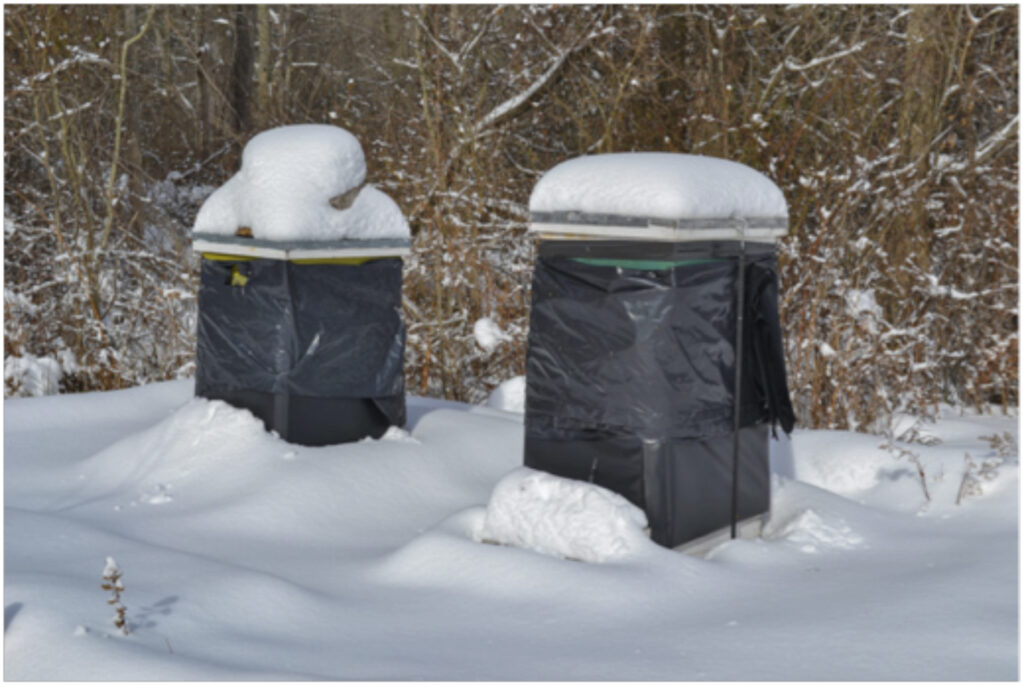Discovering the real meaning of beekeeping

by Richard Satterlee
On January 20, when the temperature warmed up to a balmy 35 degrees after a long week in the mid-20s, I worked my way through the foot and a half of snow to check my two beehives. My plan was to place a candy board on one of the hives, and if successful, I would place another candy board on my second hive later.
There they stood, stately and so nicely wrapped in a newly purchased black foam. I left a full super of honey from last fall for a winter such as this. I stood there in the silence of the morning, wondering if I had done everything right for them. I had this dreadful feeling that they were dead. I placed my ear to listen on the side of the brood box for any sounds. Nothing, nada! Immediate thoughts of, “I failed at beekeeping again? Lost another hive because of my carelessness. Why didn’t I treat them for mites earlier in the fall? Did I properly ventilate the hive? They were strong going into last fall!”
I brushed off the snow, thinking I really did not need the veil I just placed over my head, and slowly opened up the hive. I have lost two hives in my few years of beekeeping, so, here we go again, I thought. I pried open the top cover with my hive tool, then the inner cover to expose an insulation box I had made in the fall – still no signs of life. Expecting the worst, I slowly lifted the insulation box. There they were, alive, buzzing, actively moving, all in one big cluster!
I just wanted to stand there and relish the moment. My bees did not seem to take it the same way. I had just torn off an insulated roof from their 90-degree home. Their obvious anger brought me back to reality. Those few seconds of joy were immediately swallowed up by getting my act together to protect my bees. I carefully placed the candy board over the super and closed it up. I tried not to appear too anxious or nervous. I have learned that your emotions will transfer to the bees. Placing the top cover, the inner cover, and the insulated box, I stepped back, checked the outside weather wrapping, and looked at my work. I said to myself, “Man, this beekeeping stuff is easy!”
I first thought of beekeeping five years ago to this month, though I can’t remember why I decided to go into it. The sweet, pure, naturally-grown honey was a definite attraction, and the farming aspect of raising and caring for your own living crop (small in individual size but huge in population) was exciting. I was a science teacher, and the science of beekeeping proved incredible. I had a woodshop and could save money by making my own Langstroth hives. Besides, I thought saving the bees from all these things, such as mites and pesticides that kill our critical pollinators, would save our planet from losing its fruit trees, vegetable gardens, and flowers.
Beekeeping has its moments of anticipation, anxious worry, and fear of doing the wrong thing, yet the enjoyment of caring for these little insects that will sometimes show an attitude but will give you the gift of the most wonderful natural food that has been recorded since Biblical days. It has been a steep learning curve, but one that has challenged and supported my recently retired life.
I can sum up my feelings by remembering an interaction between myself and a new visitor at a Rochester Bee Association meeting. This was, of course, during pre-COVID days. The visitor leaned over during a pause in the presentation on winterizing your hives and asked, “Do you think I should get into beekeeping?” I immediately thought that the guy on my right has over 200 hives and has been in the business his whole life, why don’t you ask him? I didn’t, of course. I looked her in the eyes and said, “You know, when it is all said and done, beekeeping is one of the most amazing, rewarding, and joyful hobbies to have. You are going to love it!”
Those interested in beekeeping in the Rochester area can visit www.rochesterbeekeepers.com for information.
Provided photos





